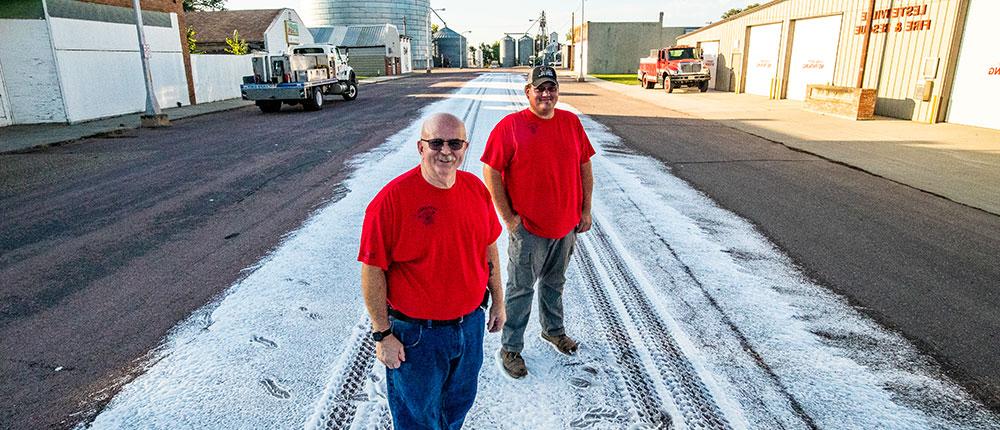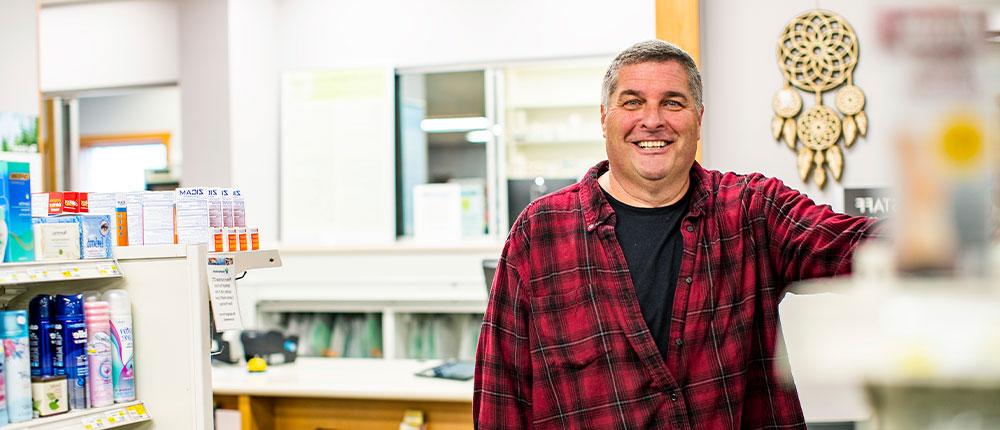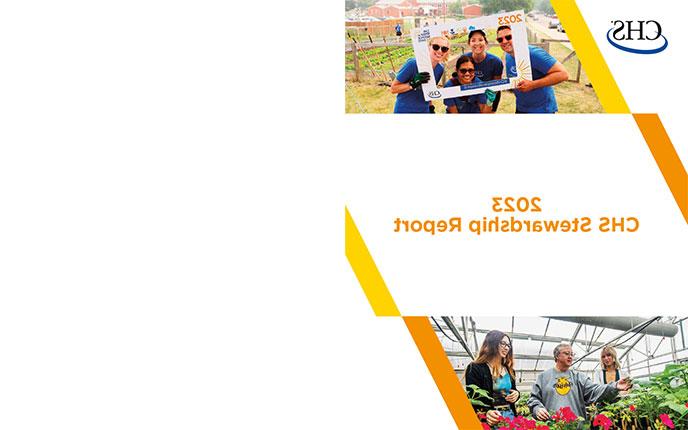Working through war

Anna Sankina, who heads up government affairs for CHS Europe, walks past a display of captured Russian tanks and artillery in her home city of Kyiv, Ukraine.
By Amy Sitze
Several weeks after the Russian invasion of Ukraine in February 2022, Anna Sankina was driving to safety in Romania with her husband and two children, ages 8 and 10 at the time. Suddenly, the family saw Russian military helicopters appear on the horizon.
“We were praying they would go in a different direction and not come toward us, because they would for sure shoot at us,” says Sankina, based in Kyiv, Ukraine, who heads up government affairs for CHS Europe. “It was so scary.”
Fleeing toward safety
That experience was only one stressful moment Sankina and other CHS employees in Ukraine have faced since the invasion, she says.
After weeks of preparation for a potential invasion, CHS took immediate action amid the chaos, violence and uncertainty that followed the first Russian attack. For employees and family members who wished to leave (men ages 18 to 60 were required to stay in the country), the company chartered a bus to a town near Bucharest, Romania, and arranged hotel rooms, access to a child psychologist, legal assistance, dental and medical care and other services.
Sankina and her family decided not to join her CHS colleagues in Romania right away. Instead, worried about her parents, the family stayed with them in a town about 40 miles from Kyiv. Though it was comforting to be together, the situation was uncertain.
“We were afraid because we didn’t know which way the Russians would be coming,” she says. “There was a risk of food and fuel shortages, as well as concern about internet and electricity as Russia threatened to shell our infrastructure.”

Eventually, they decided to leave. Sankina and her children moved into the temporary housing provided by CHS, while her husband stayed in a town near Ukraine’s western border because it was too dangerous to return to Kyiv.
Wanting to find an environment where she could best focus on her job, she and her children then moved to Poland and later to Germany, where they stayed for two months with a stranger who opened her guest house to Sankina – and even cared for her children when she needed to travel for work.
The instability was tough on her kids. “The war made them older – way older,” she says. “I told them, ‘It’s only me. We don’t have your dad with us. You have to behave and you have to be grown up now.’” They quickly understood the new normal, she says, making friends and joining activities at the local school.
Of course, it was hard on Sankina, too. “You are like a robot. You wake up, you make yourself look professional, you don’t think or cry or remember,” she says. “You just survive.”
‘A land of heroes’
In June 2022, after the Ukrainian military had secured Kyiv, the family moved back to their home. Now, more than a year later, Sankina says there’s a semblance of normal life in the city: coffee shops, restaurants, theaters and other businesses are open, and people go through the motions of their former lives.
But it’s hard to live a normal life when air raid sirens wail almost every night, the sound of explosions wakes you up, friends and relatives are killed or live in constant danger, and the news is full of reports of Russian atrocities. The employees in the CHS Kyiv office have continued working from various locations throughout the war, but the way they do their jobs has changed – both because it’s harder to move grain in war conditions and because of the personal stress they live with every day.
For example, Sankina says, HR occasionally sends an email telling Kyiv-based employees to work from home because Russian bombing makes it too dangerous to travel to the office. And the farmers they work with are facing unimaginable challenges, including mines in their fields and, in some cases, entire farming operations destroyed by bombs.
“I will proudly say that we are a land of heroes,” she says. “We are struggling but we’re trying to keep the wheels turning.”
Soon after the Russian invasion, the Black Sea ports, which are Ukraine’s main export arteries, were closed. Local government and businesses had to quickly redirect grain flows through Ukraine’s western borders, where grain could be moved by rail, barge and trucks.
CHS has been using cross-border points with Romania to send grain to that country’s Constanta port. The company has also used trucks, hoppers and barges in Danube River ports to move the grain produced by local farmers. “CHS continues to feed the world with Ukrainian grain despite numerous issues caused by the uncertainties of the war,” Sankina says.

Strength for the long haul
CHS employees in Ukraine work as buyers, originators, contract execution staff, compliance, HR and IT as part of the Europe, Middle East and Africa (EMEA) team. With regional headquarters in Geneva and offices in Bulgaria, Hungary, Italy, Romania, Serbia, Spain and Ukraine, the EMEA team sources and markets grain, oilseeds and fertilizer in the Black Sea region, Mediterranean Basin and Middle East.
Sankina’s role is to support the business-to-government team and make sure the supply chains run as smoothly as possible under difficult conditions.
She says the Kyiv team appreciates the support of CHS colleagues from around the world. In May 2022, hundreds of employees contributed $87,611 to help colleagues in Ukraine with personal and family expenses caused by war and displacement.
What she most wants the wider world to know is that Ukrainians are strong and resilient.
“What keeps us going is that we manage to turn fear and pain into productive energy so we can focus on the main thing – our victory,” Sankina says. “Everybody is doing everything they can to support victory. We will never be tired.”




